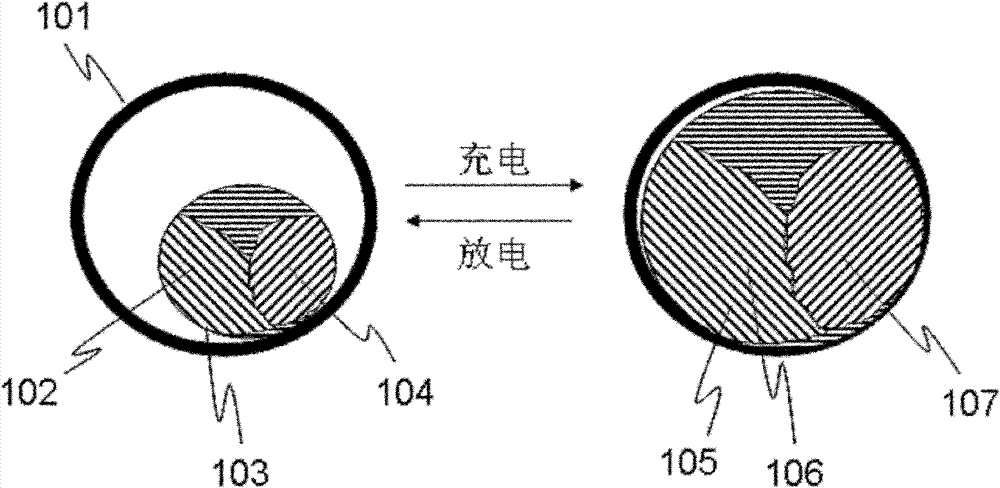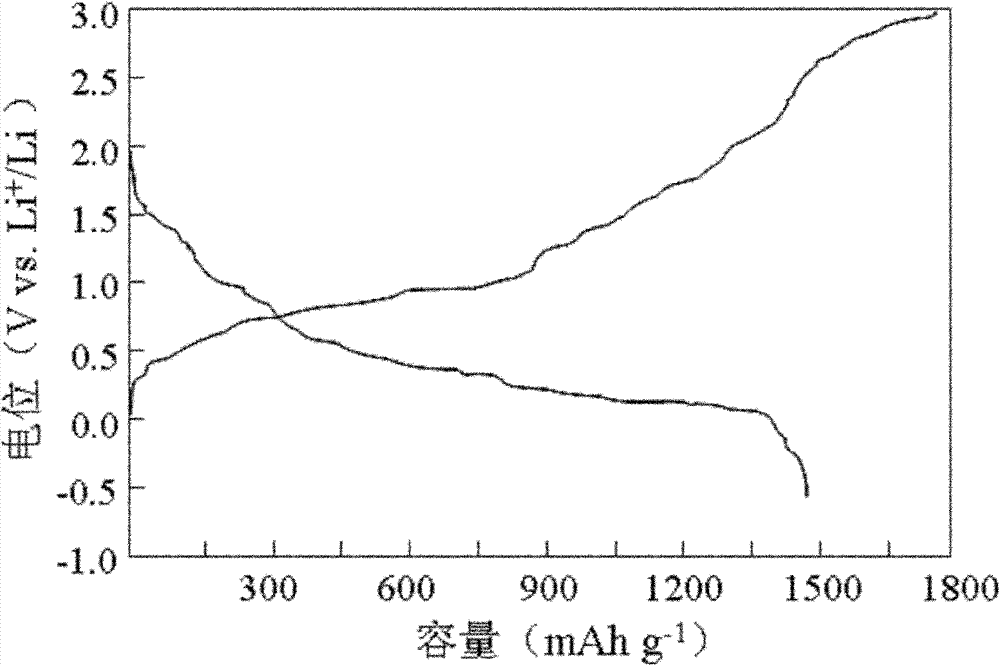Method for preparing conductive carbon film-coated calcium or calcium-tin alloy serving as anode material of lithium battery
A conductive carbon film and negative electrode material technology, which is applied to battery electrodes, lithium batteries, non-aqueous electrolyte batteries, etc., can solve problems such as poor cycle performance, achieve uniform thickness, easy preparation, and reduce electrode polarization.
- Summary
- Abstract
- Description
- Claims
- Application Information
AI Technical Summary
Problems solved by technology
Method used
Image
Examples
Embodiment 1
[0033] Example 1: Preparation of carbon-coated calcium material
[0034] Take metal calcium particles with a purity of 99.99% and heat to 850 o After C is melted, it is sprayed with high-purity argon (purity 99.999%) and sprayed into the polyethylene glycol liquid. The calcium droplets are cooled in the polyethylene glycol liquid to form a spherical powder. At the same time, the calcium droplets that are in contact with the calcium droplets The polyethylene glycol is carbonized to form a carbon-coated calcium material. Polyethylene glycol has a molecular weight of 800 and a purity of 99%.
[0035] Filter out the carbon-coated calcium material and calcinate it again in a vacuum atmosphere with the temperature controlled at 600 o C, Further carbonization to remove polyethylene glycol remaining on the carbon-coated calcium material. After cooling, the carbon-coated calcium material is obtained as the negative electrode material for high-capacity lithium-ion batteries.
Embodiment 2
[0036] Example 2: Carbon-coated Ca-Ca 2 Preparation of Sn eutectic alloy
[0037] Take metal calcium and tin particles with a purity of 99.99% in a mass ratio of 58:42, at 900 o After C is melted, it is sprayed with high-purity argon (purity 99.999%) and sprayed into the polyethylene glycol liquid. The calcium-tin alloy droplets form spherical Ca-Ca after cooling in the polyethylene glycol liquid. 2 Sn eutectic powder, at the same time, the polyethylene glycol in contact with Ca-Sn alloy droplets is carbonized to form carbon-coated Ca-Ca 2 Sn eutectic material. Polyethylene glycol has a molecular weight of 600 and a purity of 99%. Filter out carbon-coated Ca-Ca 2 Sn eutectic material, calcined again in the atmosphere of high-purity argon (purity 99.999%), the temperature is controlled at 700 o C, Further carbonization to remove polyethylene glycol remaining on the carbon-coated calcium material. After cooling, carbon-coated Ca-Ca 2 Sn eutectic materials are used as anod...
Embodiment 3
[0038] Example 3: Carbon-coated CaSn-CaSn 3 Eutectic Alloy Preparation
[0039] Take metal calcium and tin particles with a purity of 99.99% according to the mass ratio of 13.5:86.5, at 700 o After C is melted, it is sprayed with high-purity argon (purity 99.999%) and sprayed into the polyethylene glycol liquid. The calcium-tin alloy droplets form spherical CaSn-CaSn after cooling in the polyethylene glycol liquid. 3 Eutectic powder, at the same time, the polyethylene glycol in contact with the calcium-tin alloy droplets is carbonized to form carbon-coated CaSn-CaSn 3 eutectic material. Polyethylene glycol has a molecular weight of 200 and a purity of 99%. Filter out carbon-coated CaSn-CaSn 3 Eutectic material, calcined again in an atmosphere of high-purity argon (purity 99.999%), the temperature is controlled at 550 o C, Further carbonization to remove polyethylene glycol remaining on the carbon-coated calcium material. After cooling, carbon-coated CaSn-CaSn 3 Eutectic...
PUM
 Login to View More
Login to View More Abstract
Description
Claims
Application Information
 Login to View More
Login to View More - R&D
- Intellectual Property
- Life Sciences
- Materials
- Tech Scout
- Unparalleled Data Quality
- Higher Quality Content
- 60% Fewer Hallucinations
Browse by: Latest US Patents, China's latest patents, Technical Efficacy Thesaurus, Application Domain, Technology Topic, Popular Technical Reports.
© 2025 PatSnap. All rights reserved.Legal|Privacy policy|Modern Slavery Act Transparency Statement|Sitemap|About US| Contact US: help@patsnap.com


